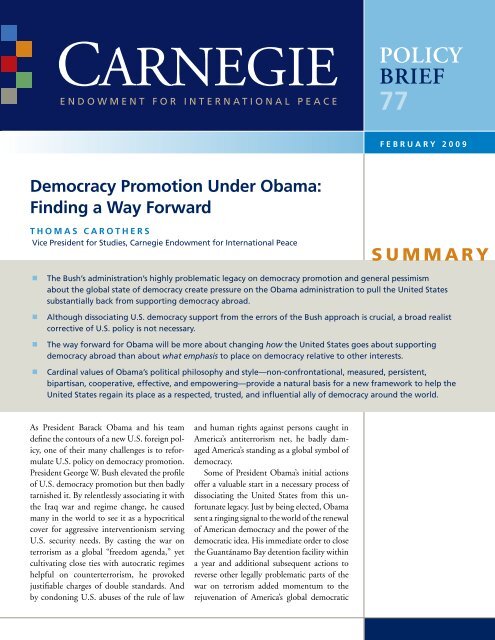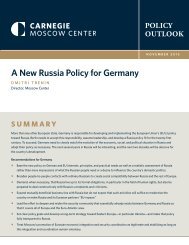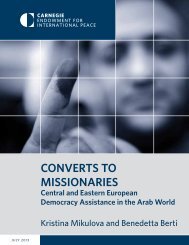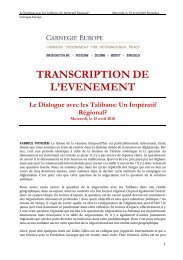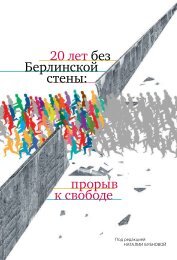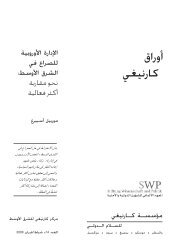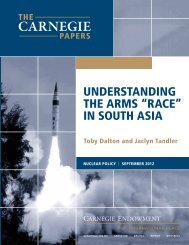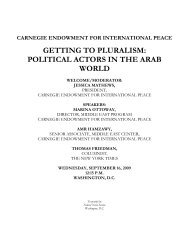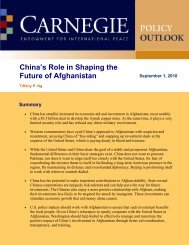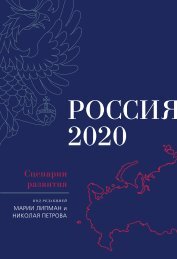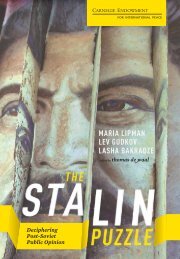Democracy Promotion Under Obama - Carnegie Endowment for ...
Democracy Promotion Under Obama - Carnegie Endowment for ...
Democracy Promotion Under Obama - Carnegie Endowment for ...
You also want an ePaper? Increase the reach of your titles
YUMPU automatically turns print PDFs into web optimized ePapers that Google loves.
CARNEGIE<br />
ENDOWMENT FOR INTERNATIONAL PEACE<br />
<strong>Democracy</strong> <strong>Promotion</strong> under <strong>Obama</strong>:<br />
Finding a Way Forward<br />
ThOmas CarOThers<br />
Vice President <strong>for</strong> Studies, <strong>Carnegie</strong> <strong>Endowment</strong> <strong>for</strong> International Peace<br />
As President Barack <strong>Obama</strong> and his team<br />
define the contours of a new U.S. <strong>for</strong>eign policy,<br />
one of their many challenges is to re<strong>for</strong>mulate<br />
U.S. policy on democracy promotion.<br />
President George W. Bush elevated the profile<br />
of U.S. democracy promotion but then badly<br />
tarnished it. By relentlessly associating it with<br />
the Iraq war and regime change, he caused<br />
many in the world to see it as a hypocritical<br />
cover <strong>for</strong> aggressive interventionism serving<br />
U.S. security needs. By casting the war on<br />
terrorism as a global “freedom agenda,” yet<br />
cultivating close ties with autocratic regimes<br />
helpful on counterterrorism, he provoked<br />
justifiable charges of double standards. And<br />
by condoning U.S. abuses of the rule of law<br />
and human rights against persons caught in<br />
America’s antiterrorism net, he badly damaged<br />
America’s standing as a global symbol of<br />
democracy.<br />
Some of President <strong>Obama</strong>’s initial actions<br />
offer a valuable start in a necessary process of<br />
dissociating the United States from this un<strong>for</strong>tunate<br />
legacy. Just by being elected, <strong>Obama</strong><br />
sent a ringing signal to the world of the renewal<br />
of American democracy and the power of the<br />
democratic idea. His immediate order to close<br />
the Guantánamo Bay detention facility within<br />
a year and additional subsequent actions to<br />
reverse other legally problematic parts of the<br />
war on terrorism added momentum to the<br />
rejuvenation of America’s global democratic<br />
POLICY<br />
BRIEF<br />
77<br />
February 2009<br />
Summary<br />
n The Bush’s administration’s highly problematic legacy on democracy promotion and general pessimism<br />
about the global state of democracy create pressure on the <strong>Obama</strong> administration to pull the United States<br />
substantially back from supporting democracy abroad.<br />
n Although dissociating U.S. democracy support from the errors of the Bush approach is crucial, a broad realist<br />
corrective of U.S. policy is not necessary.<br />
n The way <strong>for</strong>ward <strong>for</strong> <strong>Obama</strong> will be more about changing how the United States goes about supporting<br />
democracy abroad than about what emphasis to place on democracy relative to other interests.<br />
n Cardinal values of <strong>Obama</strong>’s political philosophy and style—non-confrontational, measured, persistent,<br />
bipartisan, cooperative, effective, and empowering—provide a natural basis <strong>for</strong> a new framework to help the<br />
United States regain its place as a respected, trusted, and influential ally of democracy around the world.
Thomas Carothers is vice president<br />
<strong>for</strong> studies at the <strong>Carnegie</strong><br />
<strong>Endowment</strong> <strong>for</strong> International<br />
Peace. In this capacity, he oversees<br />
the <strong>Democracy</strong> and Rule of Law<br />
Program, Middle East Program,<br />
and <strong>Carnegie</strong> Europe.<br />
Carothers is a leading authority<br />
on democracy promotion and<br />
democratization worldwide as<br />
well as an expert on U.S. <strong>for</strong>eign<br />
policy generally. He is the founder<br />
and director of the <strong>Democracy</strong><br />
and Rule of Law Program, which<br />
analyzes the state of democracy in<br />
the world and the ef<strong>for</strong>ts by the<br />
United States and other countries<br />
to promote democracy. In<br />
addition, he has broad experience<br />
in matters dealing with human<br />
rights, international law, <strong>for</strong>eign<br />
aid, rule of law, and civil society<br />
development.<br />
He is the author or editor of<br />
eight critically acclaimed books<br />
on democracy promotion as well<br />
as many articles in prominent<br />
journals and newspapers. He has<br />
been a visiting faculty member<br />
at Ox<strong>for</strong>d University, Central<br />
European University, and the<br />
Johns Hopkins School of Advanced<br />
International Studies.<br />
Prior to joining the <strong>Endowment</strong>,<br />
Carothers practiced international<br />
and financial law at Arnold &<br />
Porter and served as an attorneyadviser<br />
in the Office of the Legal<br />
Adviser of the U.S. Department of<br />
State.<br />
2 POLICY BRIEF<br />
standing. His sober approach to Iraq—talking<br />
about it as a daunting policy challenge rather<br />
than as a shining example of U.S. democracy<br />
promotion—halts a long, painful delegitimization<br />
of the democracy promotion concept.<br />
His expressed openness to diplomatic engagement<br />
with hostile governments has put the<br />
regime-change line to rest.<br />
Restorative though these steps have been,<br />
they are more preparatory to than constitutive<br />
of a new approach to democracy promotion.<br />
As <strong>Obama</strong> and his advisers <strong>for</strong>mulate<br />
such an approach in the months ahead, they<br />
will face significant pressure to go beyond<br />
dissociating the United States from the Bush<br />
legacy and pull back on the promotion of<br />
democracy generally. This pressure has multiple<br />
sources. Many observers see Bush’s push<br />
on democracy in the Middle East as having<br />
been counterproductive and believe <strong>Obama</strong><br />
should embrace the old line of uncritical support<br />
<strong>for</strong> friendly Arab autocrats. Also gaining<br />
currency is the notion that the United States<br />
has been pushing elections too hard in politically<br />
shaky developing countries and should<br />
back away on electoral support and concentrate<br />
instead on foundational elements like<br />
building the rule of law and an effective state.<br />
Common, too, is the view that, not just in<br />
the Middle East and on elections but much<br />
more generally, Bush’s enthusiasm <strong>for</strong> democracy<br />
promotion has turned U.S. policy away<br />
from core interests, necessitating a broad realist<br />
corrective. Adding still further weight to<br />
this cautionary outlook is a growing sense in<br />
many quarters that democracy is doing badly<br />
in the world <strong>for</strong> a whole variety of reasons and<br />
that, in the words of one leading democracy<br />
specialist, the world is experiencing “a democratic<br />
recession.”<br />
Although <strong>Obama</strong> and his team, their hands<br />
more than full with urgent issues like the global<br />
financial crisis and the Israeli–Palestinian<br />
conflict, have not yet shown their cards, there<br />
are hints they may be inclined toward a general<br />
pullback on promoting democracy. <strong>Obama</strong><br />
rarely spoke about the topic while a candidate<br />
and has made little mention of it since becoming<br />
president, including in his inaugural address.<br />
Hillary Clinton touched only glancingly<br />
on democracy support in her Senate confirmation<br />
hearings. The “three D’s” policy framework<br />
that she has articulated—defense, diplomacy,<br />
and development—noticeably leave<br />
out the potential fourth D of democracy. In<br />
January both <strong>Obama</strong> and Clinton expressed<br />
the concern that the United States has been<br />
overemphasizing elections in its democracy<br />
and development work.<br />
Caution and moderation on democracy policy<br />
are very much in order, including a careful<br />
post-Bush process of repair and recovery. At the<br />
same time, however, President <strong>Obama</strong> and his<br />
<strong>for</strong>eign policy team should not, either explicitly<br />
or implicitly, embrace a broad realist corrective.<br />
The various pressures cited above that might<br />
point to a need <strong>for</strong> such a shift are a combination<br />
of misconceptions and myths. Despite all<br />
the problems of recent years, it remains both<br />
possible and advisable <strong>for</strong> the United States to<br />
be an active, influential supporter of democracy<br />
abroad. Moreover, key elements of <strong>Obama</strong>’s<br />
overall political philosophy provide a natural<br />
basis <strong>for</strong> a new framework in the domain of<br />
democracy support. Realist though some of his<br />
core instincts may be, <strong>Obama</strong> has in fact all the<br />
necessary attributes to be a natural leader of a<br />
new and fruitful period of U.S. prodemocracy<br />
policies and programs.<br />
middle east misconceptions<br />
The idea that the <strong>Obama</strong> administration<br />
should stay clear of any ef<strong>for</strong>t to support democratic<br />
change in the Middle East arises from<br />
the reductionistic verdict that U.S. policy analysts<br />
and journalists often render on Bush’s attempts<br />
at Arab democratization: Bush wanted<br />
Arab democracy, the argument goes, and look<br />
what he got—Arab states holding elections<br />
that empowered troublesome Islamists, such<br />
as Hizbollah, Hamas, Iraqi Islamists, and the<br />
Egyptian Muslim Brotherhood. The United<br />
States, it follows, would be better off not stirring<br />
that pot again anytime soon.
DEMOCRACY PROMOTION UNDER OBAMA: FINDINg A WAY FORWARD 3<br />
Two principal misconceptions underlie this<br />
view. First, although Bush spoke often about<br />
the value and possibility of Arab democracy<br />
and established some aid programs and diplomatic<br />
initiatives to support political and other<br />
re<strong>for</strong>ms, he hardly made a major push <strong>for</strong> it.<br />
<strong>Under</strong>neath his lofty prodemocracy rhetoric<br />
and mild prodding of Arab counterparts,<br />
business as usual continued <strong>for</strong> the most part,<br />
that is, close U.S. security and economic ties<br />
with autocratic Arab allies like Saudi Arabia,<br />
the smaller Gulf states, Egypt, Jordan, and<br />
Morocco. The Iraqi intervention was, of course,<br />
an enormous endeavor but one rooted in security<br />
concerns with democracy added as a goal<br />
only very secondarily. The prodemocratic diplomatic<br />
pressure on Arab allies, such as it was,<br />
lasted only briefly—after the shock of Hamas’s<br />
victory in the 2006 Palestinian elections, the<br />
Bush administration largely abandoned it.<br />
Second, Islamist gains in Egypt, Iraq,<br />
Lebanon, and Palestine should not be a showstopper<br />
<strong>for</strong> U.S. support <strong>for</strong> Arab democracy.<br />
Hizbollah and Hamas are special cases—<br />
Islamist political organizations engaged in<br />
armed struggle against Israel, including the use<br />
of terrorism. Their electoral successes should<br />
not provoke or fuel a generalized fear of wider<br />
and freer political participation in Arab states.<br />
The Islamist movements and parties taking part<br />
in elections in most of the Arab world—like<br />
Jordan’s Islamic Action Front, Morocco’s Party<br />
of Justice and Development, and Kuwait’s<br />
Islamic Constitutional Movement—are nonviolent.<br />
Electoral participation by such groups<br />
has not overwhelmed the political system and<br />
has tended to encourage their moderation. The<br />
alternative of completely bottling up Islamists<br />
politically only fosters tensions and radicalism<br />
that spell serious trouble down the road.<br />
While Bush’s push on Arab democracy fell<br />
far short of the hopes he had invested in it, it<br />
was not pointless. President Bush’s declarations<br />
on the subject, and the associated prore<strong>for</strong>m<br />
aid initiatives, did help stimulate an already<br />
existing debate within the Arab world over<br />
democracy. Due to his extremely low credibil-<br />
ity in the Arab world, though, Bush was not<br />
an effective messenger. Nevertheless, his basic<br />
message—that Arab states should and can<br />
overcome their political stagnation and decay<br />
and that their doing so would be good both <strong>for</strong><br />
them and <strong>for</strong> the United States—is a valuable<br />
one. If President <strong>Obama</strong> continues to build on<br />
Caution and moderation on democracy policy are<br />
very much in order, including a careful post-bush<br />
process of repair and recovery.<br />
his initial credibility in the region, he could<br />
become an effective spokesperson <strong>for</strong> this idea<br />
and build around it modest but worthwhile<br />
supporting aid and diplomatic initiatives.<br />
Overemphasizing elections?<br />
The charge that Washington errs by overemphasizing<br />
elections at the expense of other<br />
building blocks of democratic development,<br />
in effect, equating elections with democracy,<br />
is not new. In the 1980s, critics assailed the<br />
Reagan administration <strong>for</strong> presenting elections<br />
in El Salvador as the achievement of<br />
democracy in that war-torn country. In the<br />
1990s, some scholars accused the United<br />
States of contributing to the spread of illiberal<br />
democracies and civil conflicts by pushing<br />
countries to elections prematurely. The<br />
concern surged again in the Bush years with<br />
some critics faulting Bush <strong>for</strong> overemphasizing<br />
elections, such as in Iraq, Palestine, and<br />
the Arab world generally.<br />
It is certainly true that over the past 25<br />
years the United States has very often supported<br />
elections in countries moving away from<br />
authoritarian rule, through diplomatic encouragement,<br />
technical assistance, and election<br />
monitoring. Yet in the overall domain of<br />
U.S. democracy support, elections are hardly<br />
dominant. Less than 20 percent of U.S. democracy<br />
assistance goes to electoral programs.<br />
Most democracy aid already goes to precisely<br />
the sorts of putatively foundational areas that<br />
electoral skeptics call <strong>for</strong>, such as developing
4 POLICY BRIEF<br />
the rule of law, building governance, promoting<br />
civil society, enhancing civic education,<br />
and strengthening parliamentary bodies. U.S.<br />
electoral assistance in a country is almost always<br />
just one element of a more comprehensive<br />
set of political and socioeconomic development<br />
ef<strong>for</strong>ts. In Kenya, <strong>for</strong> example, the<br />
violence following the December 2007 elections<br />
was tragic, but the United States was not<br />
guilty of narrowly supporting elections—U.S.<br />
assistance there <strong>for</strong> years included a wide range<br />
of other political as well as socioeconomic programs.<br />
Moreover, it seems unlikely that Kenya<br />
Despite all the problems of recent years, it<br />
remains both possible and advisable <strong>for</strong> the<br />
united states to be an active, influential<br />
supporter of democracy abroad.<br />
would have been better off today if it had not<br />
held elections in this decade but instead had<br />
continued to live under the decaying, oppressive<br />
rule of earlier years.<br />
It is true that President Bush, like some of<br />
his recent predecessors, did greatly overstate<br />
the democratic significance of certain elections,<br />
such as his triumphalism over the 2005<br />
Iraqi elections. These cases, however, were attempts<br />
at taking credit <strong>for</strong> apparent political<br />
progress in controversial settings, not accurate<br />
reflections of the broader makeup of U.S. ef<strong>for</strong>ts<br />
to promote democracy. No part of the<br />
U.S. policy bureaucracy engaged in democracy<br />
support and no U.S. democracy promotion<br />
group bases its actions around the idea that<br />
elections equal democracy.<br />
Furthermore, countries throughout the<br />
developing and postcommunist worlds have<br />
not been holding elections because the United<br />
States has been pressuring them to do so. A<br />
norm of democratic participation has spread<br />
widely in the world. When authoritarian regimes<br />
weaken or collapse, citizens usually press<br />
<strong>for</strong> the chance to have a political say, through<br />
elections. In Iraq, <strong>for</strong> example, the United<br />
States actually discouraged local actors from<br />
moving quickly to elections after the ouster of<br />
Saddam Hussein, changing gears only when<br />
the Iraqi Shi’i leader Ayatollah Ali al-Sistani<br />
insisted on elections. Only in a very small<br />
number of settings—such as highly aid-dependent<br />
countries or post–civil war countries<br />
that have a major international peacekeeping<br />
presence, like Bosnia in the second half of the<br />
1990s—do the United States or other outside<br />
actors have so much influence that they control<br />
whether elections happen.<br />
The <strong>Obama</strong> administration should certainly<br />
avoid celebrating too loudly any particular<br />
election in a transitional country. But it should<br />
not downgrade electoral support relative to<br />
other elements of democracy building or avoid<br />
it generally. Given that countries all around<br />
the world are holding regular elections, largely<br />
at their own behest, why not offer the kinds of<br />
technical assistance and diplomatic support<br />
that can help make these elections more technically<br />
credible and politically inclusive and<br />
there<strong>for</strong>e less likely to break down or provoke<br />
conflict?<br />
broader Confusion<br />
Pressure on <strong>Obama</strong> <strong>for</strong> a broad realist corrective<br />
also comes from the view that not just<br />
in the Middle East but generally around the<br />
world Bush overdid it on democracy, recklessly<br />
pursuing a global freedom agenda that<br />
diverted the United States from its core interests.<br />
Bush’s soaring rhetoric about democracy<br />
confused many observers, giving the impression<br />
of a greater pursuit of democracy than<br />
actually existed. So too did his intertwining<br />
of the democracy agenda with the Iraq and<br />
Afghanistan interventions, which attracted<br />
so much attention. In fact, leaving aside the<br />
Middle East (and even there, as noted above,<br />
Bush policy was only very partially prodemocratic),<br />
the place of democracy in Bush <strong>for</strong>eign<br />
policy was no greater, and in some ways<br />
was less, than in the <strong>for</strong>eign policies of his recent<br />
predecessors.<br />
Toward America’s two principal challengers,<br />
China and Russia, as well as in the many
DEMOCRACY PROMOTION UNDER OBAMA: FINDINg A WAY FORWARD 5<br />
other areas of U.S. strategic or economic engagement<br />
with nondemocratic states, such<br />
as with Azerbaijan, Ethiopia, the Gulf states,<br />
Kazakhstan, and Pakistan, the Bush administration<br />
downplayed democracy <strong>for</strong> the sake of<br />
other interests. Furthermore, although Bush<br />
tried to cast his war on terrorism as a freedom<br />
crusade, in fact the imperatives of cooperation<br />
on counterterrorism led to a warming<br />
up, rather than a cooling off, of ties with the<br />
governments in many authoritarian or semiauthoritarian<br />
countries in South Asia, Central<br />
Asia, the Middle East, Africa, and elsewhere.<br />
The Bush administration did take some<br />
visible stands on democracy. For the most<br />
part, however, these were toward states where<br />
the United States does not have any significant<br />
countervailing interests, such as Belarus,<br />
Burma, Cuba, and Zimbabwe. The administration<br />
also pursued quiet, low-level ef<strong>for</strong>ts<br />
using behind-the-scenes diplomatic cajoling<br />
and counseling, democracy assistance, and<br />
modest economic carrots and sticks to help<br />
many struggling new democracies consolidate<br />
political re<strong>for</strong>ms, especially in parts of sub-<br />
Saharan Africa, Central America, Southeastern<br />
Europe, and Southeast Asia. These were valuable<br />
ef<strong>for</strong>ts, but they represented continuity<br />
much more than change, drawing on policies<br />
and programs largely established in the 1990s<br />
and be<strong>for</strong>e.<br />
In short, Bush policy was substantially realist,<br />
leavened with some moderate Wilsonian<br />
elements, primarily around the edges. The idea,<br />
there<strong>for</strong>e, that a major post-Bush realist corrective<br />
is needed represents a serious misreading of<br />
the past eight years. Even Bush himself was<br />
confused by the disjunction between his highoctane<br />
prodemocracy rhetoric and his much<br />
more realist policies on the ground, as highlighted<br />
by his rather poignant (yet also rather<br />
odd) remark in 2007 that he felt like “a dissident”<br />
with regard to his own <strong>for</strong>eign policy.<br />
unnecessary Pessimism<br />
Rising pessimism about the state of democracy<br />
in the world also contributes to the per-<br />
ceived need <strong>for</strong> a backing away. In this view,<br />
the United States should not sail hard into a<br />
headwind but rather trim its prodemocracy<br />
sails and wait <strong>for</strong> better times. Bad news on<br />
democracy has indeed been plentiful in recent<br />
years—coups, electoral violence, the greater<br />
assertiveness of energy-rich authoritarians,<br />
In short, democracy is not in retreat around the<br />
world. a continuation of the long-term decline of<br />
tyranny and at least modest advances in democracy<br />
are certainly imaginable <strong>for</strong> the decade ahead.<br />
the rise of the China model, and the election<br />
of some dubious populist strongmen.<br />
In fact, however, when looked at across<br />
the length of this decade, the global trend is<br />
not so bad. As the 2009 Freedom House report<br />
details, since 2000 authoritarianism has<br />
decreased—the number of not-free countries<br />
has declined from 48 to 42—while the number<br />
of free countries has risen from 86 to 89.<br />
Democratic setbacks have indeed occurred,<br />
but so too have democratic advances, usually<br />
attracting much less U.S. media attention,<br />
such as the quiet, but highly significant, democratic<br />
progress of Indonesia and the anchoring<br />
of ten postcommunist states as members<br />
of the European Union. The high price of oil<br />
between 2005 and 2008 did bolster many authoritarian<br />
regimes, but the sharp drop since<br />
is now unsettling them. And while Russia’s<br />
and China’s “authoritarian capitalism” has attracted<br />
wide interest, a significant majority of<br />
citizens in every region still view democracy<br />
as the best <strong>for</strong>m of government. The diffusion<br />
of new communication technologies continues<br />
to open innovative avenues <strong>for</strong> citizen empowerment<br />
and peaceful resistance to authoritarianism.<br />
The global financial crisis is putting<br />
new pressures on many struggling democracies<br />
but is also causing many authoritarian<br />
governments to feel the heat of rising public<br />
dissatisfaction. In short, democracy is not in<br />
retreat around the world. A continuation of<br />
the long-term decline of tyranny and at least
6 POLICY BRIEF<br />
modest advances in democracy are certainly<br />
imaginable <strong>for</strong> the decade ahead.<br />
an <strong>Obama</strong> approach<br />
In re<strong>for</strong>mulating U.S. democracy promotion,<br />
the new administration should continue ef<strong>for</strong>ts<br />
to dissociate the subject from regime<br />
change, counterterrorism excesses, and general<br />
hubris. A broad realist corrective, however, is<br />
not necessary. Given the overall configuration<br />
of U.S. interests, the <strong>Obama</strong> administration<br />
will almost inevitably pursue a mix of realist<br />
and moderate Wilsonian policies largely similar<br />
to that pursued by its recent predecessors.<br />
Such a mix recognizes a broad U.S. interest in<br />
democracy but places it alongside economic<br />
The previous Washington philosophy that government<br />
is the problem rather than the solution did<br />
not help u.s. democracy aid providers move beyond<br />
helping countries establish democratic institutions to<br />
helping those institutions deliver <strong>for</strong> citizens.<br />
and security interests, largely subordinating it<br />
when other interests weigh heavily, bringing<br />
it to the <strong>for</strong>e when they do not. Beyond the<br />
post-Bush cleanup, the <strong>for</strong>ward direction <strong>for</strong><br />
<strong>Obama</strong> on democracy support will be more<br />
about changing how his administration goes<br />
about supporting democracy abroad than<br />
about what emphasis to place on democracy<br />
relative to other interests. This way <strong>for</strong>ward is<br />
more evident than the <strong>Obama</strong> <strong>for</strong>eign policy<br />
team may yet realize—key elements of President<br />
<strong>Obama</strong>’s political style and philosophy<br />
translate naturally into useful steps <strong>for</strong>ward<br />
toward a better approach.<br />
First, President <strong>Obama</strong>’s basic approach to<br />
addressing conflictive issues of all types—the<br />
nonconfrontational, measured, yet determined<br />
pursuit of balanced solutions—is the right<br />
way to address the knotty problem of trying<br />
to keep democracy on the table in relationships<br />
with major nondemocratic states where<br />
other U.S. interests require a cooperative<br />
stance. In such contexts, President Bush often<br />
relied on a personalist approach (e.g., looking<br />
into Putin’s eyes or <strong>for</strong>giving Musharraf everything)<br />
or lapsed into a good cop–bad cop pattern<br />
(employing Vice President Cheney as the<br />
bad cop), with neither approach working well.<br />
Even with significant countervailing interests<br />
dominant in such contexts, <strong>Obama</strong> can nevertheless<br />
make U.S. views on democracy credible<br />
by applying a characteristically measured,<br />
but persistent, approach in which he and his<br />
top advisers clearly and consistently state U.S.<br />
concerns on democracy and human rights<br />
within the broader framework of a relationship,<br />
carefully choosing moments of opportunity<br />
to lean somewhat harder.<br />
Second, President <strong>Obama</strong>’s strong instinct<br />
toward bipartisanship is critical <strong>for</strong> revitalizing<br />
democracy’s place in U.S. <strong>for</strong>eign policy.<br />
One of the most damaging consequences of<br />
the Bush years was the fracturing of the longstanding<br />
bipartisan consensus in this domain.<br />
By the end of Bush’s term, a sharp divergence<br />
marked the attitude of Democratic and<br />
Republican voters and policy elites toward the<br />
importance of democracy as a <strong>for</strong>eign policy<br />
goal. Re<strong>for</strong>mulating democracy policy must<br />
entail soliciting ideas and opinions on the<br />
subject from both sides of the political aisle<br />
and treating it as an inherently bipartisan endeavor,<br />
not a lone man’s crusade.<br />
Third, President <strong>Obama</strong>’s inclination,<br />
which came through so strongly in his presidential<br />
campaign, toward cooperation and<br />
partnership in mobilizing common ef<strong>for</strong>ts<br />
among diverse actors is well suited to the<br />
arena of democracy support. It is a spirit that<br />
the United States needs to project in working<br />
in societies that have broken free of authoritarianism<br />
and are struggling to consolidate<br />
democracy. The tendency often evident in<br />
the Bush administration’s approach of implicitly<br />
or explicitly telling other societies (like<br />
Nicaragua, Palestine, or others) what leaders to<br />
elect or what political ideas to believe should<br />
give way to a conception of democracy support<br />
as a genuine partnership between internal<br />
and external actors. A spirit of partnership
DEMOCRACY PROMOTION UNDER OBAMA: FINDINg A WAY FORWARD 7<br />
will also work well to open U.S. democracy<br />
policies and programs to greater cooperation<br />
with European and other international actors<br />
working on democracy’s behalf.<br />
Fourth, President <strong>Obama</strong>’s emphasis on the<br />
potentially positive role of government in solving<br />
social problems—his credo that what counts<br />
is not whether government is large or small but<br />
whether it works—fits well with a crucial rising<br />
imperative: dozens of new democracies<br />
are facing serious challenges in showing their<br />
citizens that democracy can effectively solve<br />
basic socioeconomic problems. The previous<br />
Washington philosophy that government is<br />
the problem rather than the solution hindered<br />
the ef<strong>for</strong>ts of U.S. providers of democracy<br />
aid to help countries move beyond establishing<br />
democratic institutions to helping those<br />
institutions actually deliver <strong>for</strong> their citizens.<br />
The new attitude from the top in Washington<br />
about government’s potentially positive role<br />
can thus be a boost <strong>for</strong> U.S. democracy promotion.<br />
In addition, a greater focus on making<br />
certain parts of the U.S. government work<br />
well—especially the United States Agency <strong>for</strong><br />
International Development, the largest source<br />
of U.S. democracy aid—would also be a valuable<br />
part of an <strong>Obama</strong> democracy policy.<br />
Fifth, <strong>Obama</strong>’s rhetorical style—his unusual<br />
ability to meld inspiration with restraint—<br />
is exactly the note to strike in crafting a new<br />
line about the role of democracy promotion<br />
in U.S. <strong>for</strong>eign policy. U.S. presidents almost<br />
always end up presenting U.S. democracy<br />
promotion in grander terms than actual<br />
policy reflects. Some amount of inspirational<br />
license is inevitable and can be worthwhile.<br />
However, given the lingering soreness of the<br />
subject <strong>for</strong> most <strong>for</strong>eign audiences, a considerable<br />
dose of sobriety is very much in order<br />
without giving up entirely on inspiration.<br />
President <strong>Obama</strong>’s core message, rein<strong>for</strong>ced<br />
by his disposition, his political philosophy,<br />
and his life experience, is that all people, no<br />
matter how disempowered, can gain greater<br />
control over their lives. It is a natural message<br />
of global democratic solidarity.<br />
Given the harsh legacy of Bush’s democracy<br />
promotion ef<strong>for</strong>ts and the choppy waters <strong>for</strong><br />
democracy in many regions, the search <strong>for</strong> a<br />
new framework <strong>for</strong> U.S. democracy promotion<br />
may appear daunting. Yet those engaged<br />
in the task need not look any further than<br />
to the new president’s cardinal values <strong>for</strong> the<br />
<strong>Obama</strong>’s rhetorical style—his unusual ability to meld<br />
inspiration with restraint—is exactly the note to<br />
strike in crafting a new rhetorical line about the role<br />
of democracy promotion in u.s. <strong>for</strong>eign policy.<br />
necessary key operational ideas: nonconfrontational,<br />
measured, persistent, bipartisan, cooperative,<br />
effective, and empowering. If the<br />
new administration can put those principles<br />
to work in the domain of democracy support,<br />
the United States will regain its place as a respected,<br />
trusted, and influential ally of democracy<br />
around the world. n<br />
The <strong>Carnegie</strong> <strong>Endowment</strong> normally does not<br />
take institutional positions on public policy<br />
issues; the views presented here do not<br />
necessarily reflect the views of the <strong>Endowment</strong>,<br />
its officers, staff, or trustees.<br />
© 2009 <strong>Carnegie</strong> <strong>Endowment</strong> <strong>for</strong> International<br />
Peace. All rights reserved.
www.<strong>Carnegie</strong>endowment.org<br />
The <strong>Carnegie</strong> <strong>Endowment</strong><br />
<strong>for</strong> International Peace is a<br />
private, nonprofit organization<br />
dedicated to advancing<br />
cooperation between<br />
nations and promoting active<br />
international engagement by<br />
the United States. Founded<br />
in 1910, <strong>Carnegie</strong> is nonpartisan<br />
and dedicated to achieving<br />
practical results. Building<br />
on the successful establishment<br />
of the <strong>Carnegie</strong><br />
Moscow Center, the <strong>Endowment</strong><br />
has added operations<br />
in Beijing, Beirut, and Brussels<br />
to its existing offices in<br />
Washington and Moscow.<br />
POLICY<br />
BRIEF<br />
77<br />
1779 Massachusetts Avenue, NW<br />
Washington, DC 20036<br />
Cert no. SW-COC-002251<br />
resOurCes<br />
Visit www.<strong>Carnegie</strong>endowment.org/pubs <strong>for</strong> these and other publications.<br />
stepping back from Democratic Pessimism, Thomas Carothers, <strong>Carnegie</strong> <strong>Endowment</strong> <strong>for</strong><br />
International Peace, <strong>Carnegie</strong> Paper no. 99, February 2009.<br />
<strong>Democracy</strong> <strong>Promotion</strong> During and after bush, Thomas Carothers, <strong>Carnegie</strong> <strong>Endowment</strong> <strong>for</strong><br />
International Peace, 2007, http://www.carnegieendowment.org/files/democracy_promotion_after_bush_final.pdf.<br />
The <strong>Democracy</strong> Crusade myth, Thomas Carothers, National Interest, July/August 2007,<br />
http://www.carnegieendowment.org/files/CarothersNationalInterest.pdf.<br />
Is a League of Democracies a Good Idea? Thomas Carothers, <strong>Carnegie</strong> <strong>Endowment</strong> <strong>for</strong><br />
International Peace, Policy Brief no. 59, May 2008, http://www.carnegieendowment.org/files/<br />
pb59_carothers_league_final.pdf.<br />
<strong>Democracy</strong> and Discontent, Thomas Carothers, Book Review, <strong>Democracy</strong>: A Journal of Ideas,<br />
Issue 10, Fall 2008, http://www.democracyjournal.org/article2.php?ID=6645&limit=2000&lim<br />
it2=3000&page=3.


